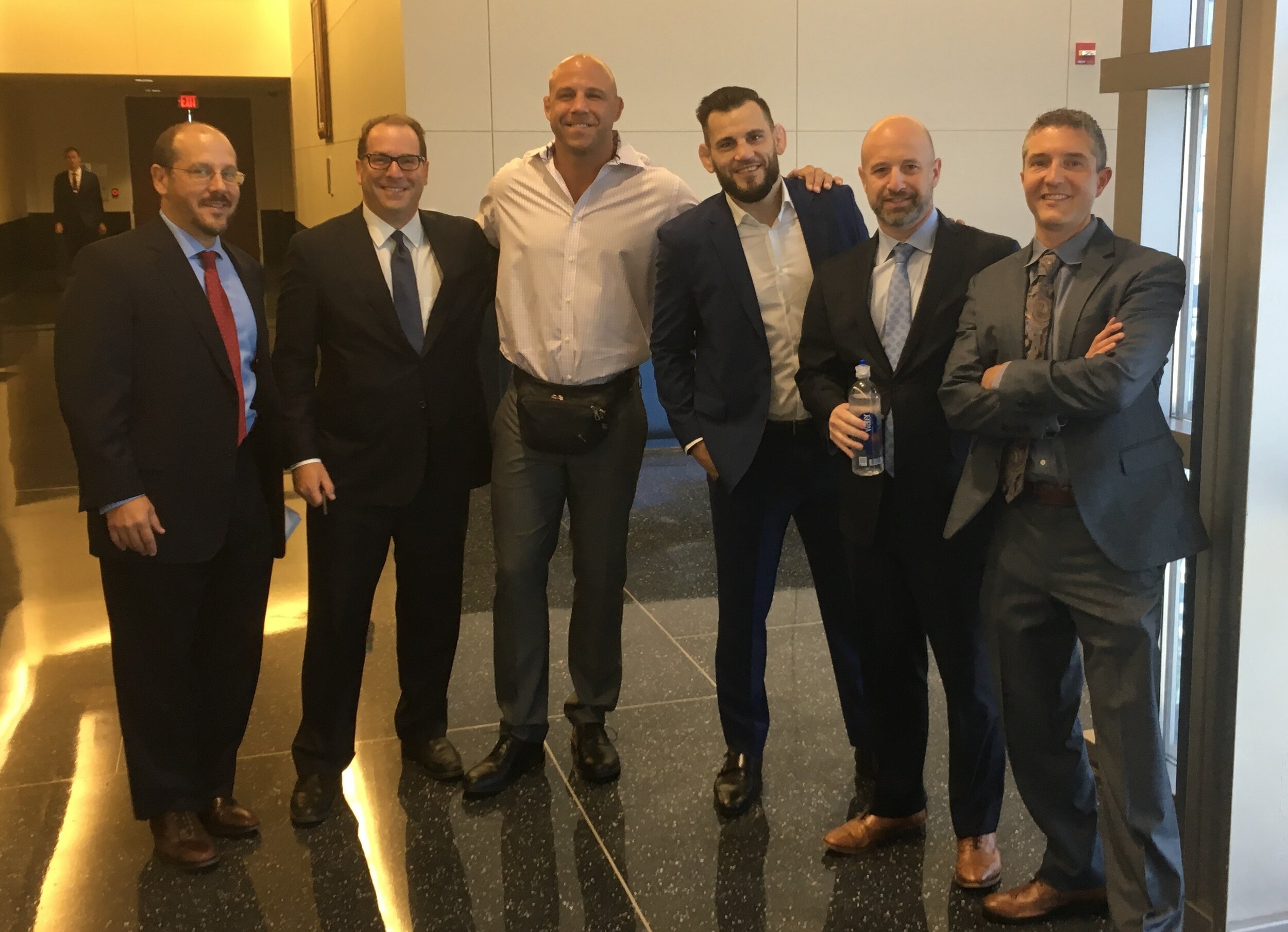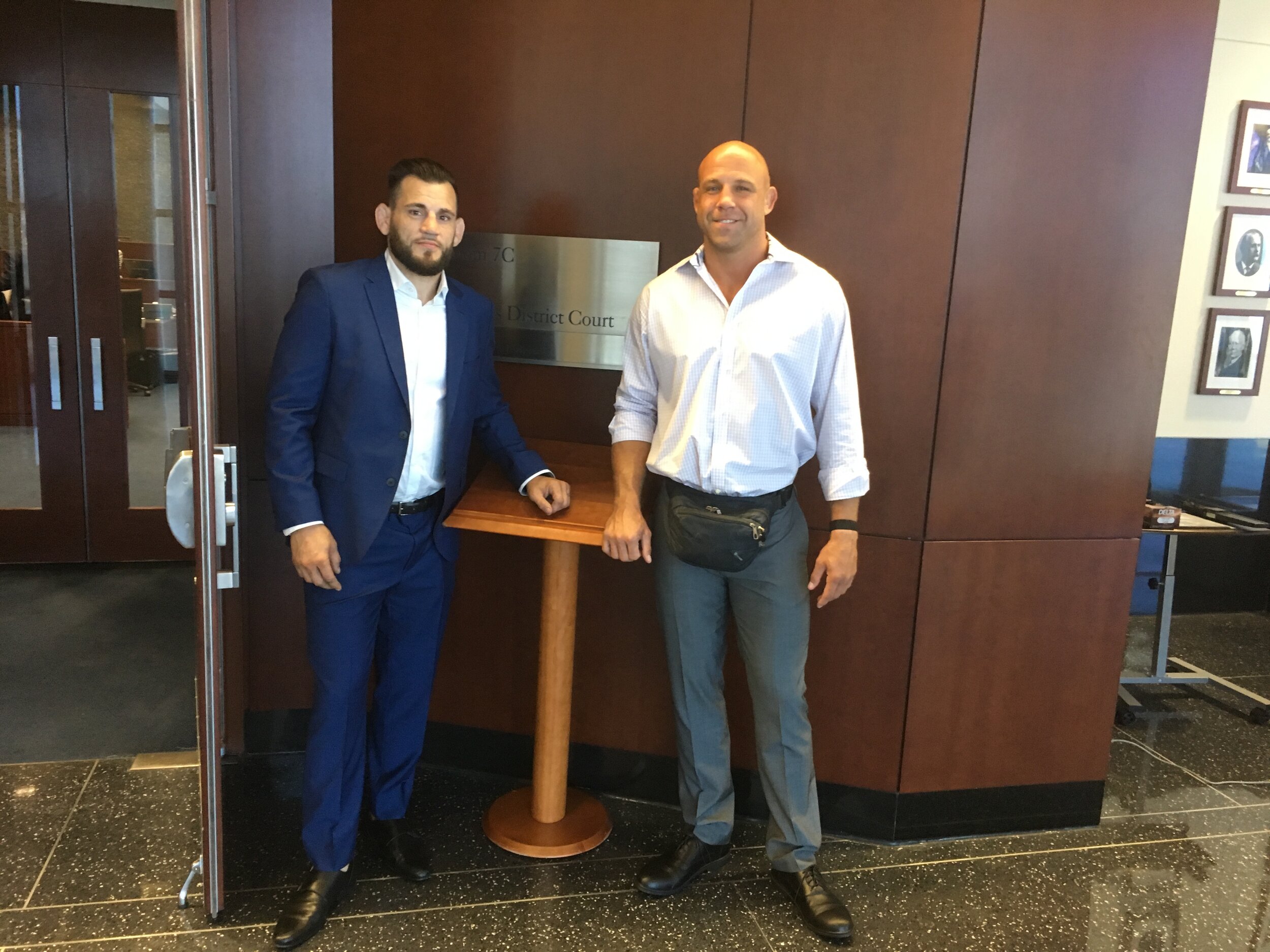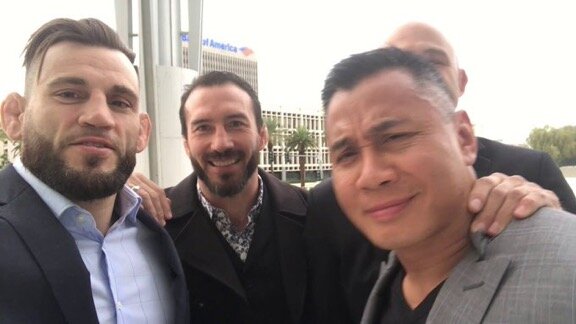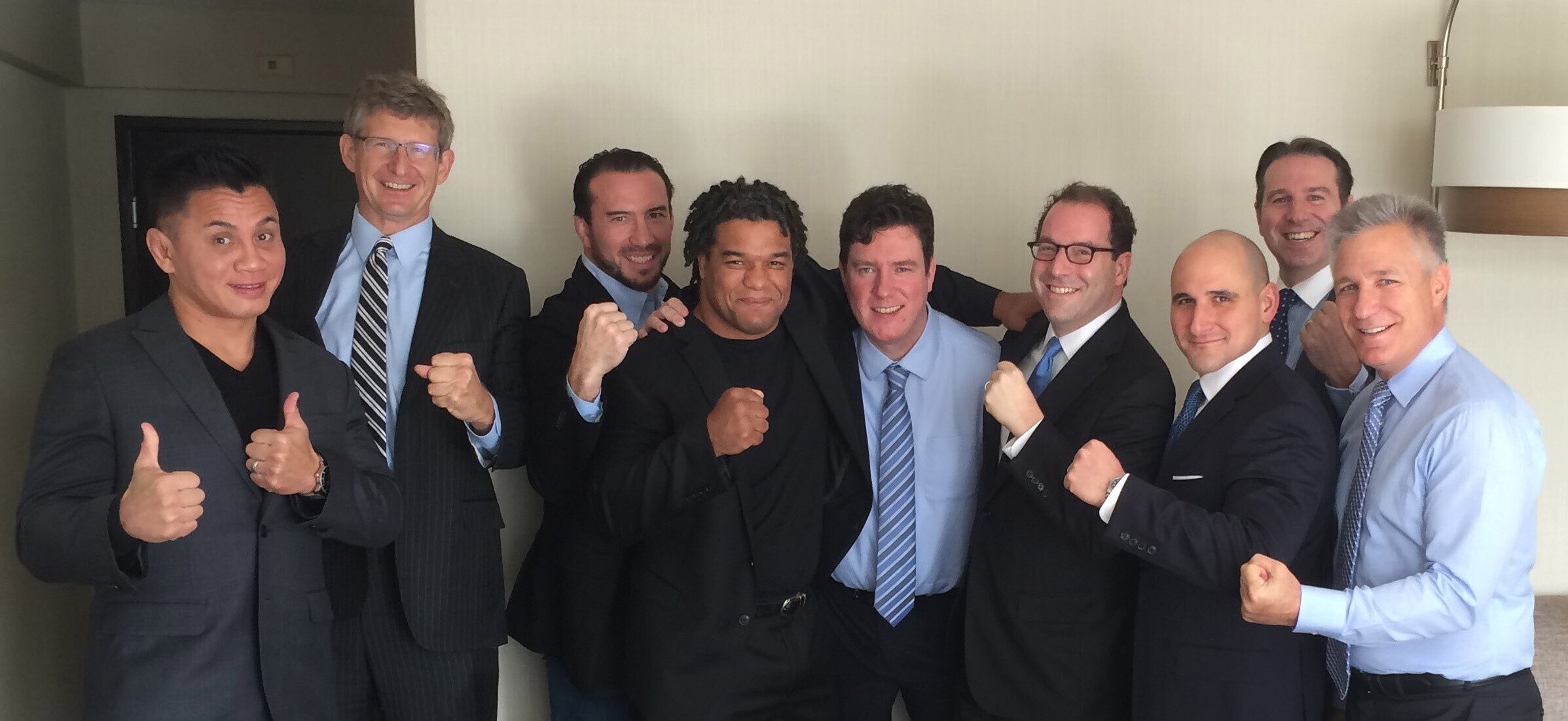









Key Developments
The Fighters Complaints
In December 2014, Cung Le, Nate Quarry, and Jon Fitch filed their initial “complaint” in federal court in California claiming that Zuffa violated the federal antitrust laws. The complaint was the first document filed in the lawsuit. It laid out all of the allegations that formed the basis of the fighters’ claims before the fighters had received any information from the UFC and other entities’ files in discovery, and explains the ways in which the fighters alleged that Zuffa acted illegally. After Zuffa successfully caused the transfer of the case from a California federal court (in San Jose) to the federal court in Las Vegas, Nevada, the fighters filed a second “amended” complaint in December 2015. The amended complaint lays out similar facts and claims as the fighters’ initial complaint but was filed in Nevada federal court.
Amended Complaint (Dec. 18, 2015)
On June 23, 2021, Kajan Johnson and C.B. Dollaway filed a proposed class action antitrust lawsuit against Zuffa, LLC (d/b/a Ultimate Fighting Championship and UFC) and its parent company Endeavor Group Holdings, Inc. The lawsuit is similar to the class action brought by Cung Le, Nathan Quarry, Jon Fitch, Brandon Vera, Luis Javier Vazquez, and Kyle Kingsbury against the UFC currently pending in federal district court in Nevada. See Cung Le, et al. v. Zuffa, LLC d/b/a Ultimate Fighting Championship and UFC, No. 2:15-cv-01045-RFB-BNW (D. Nev.) ("Le"). Like the Le action, the lawsuit filed by Johnson and Dollaway alleges that Zuffa violated antitrust laws by paying UFC fighters far less than they were entitled to receive and eliminating or hurting other MMA promoters. The class period ultimately proposed by the plaintiffs in the Le action closed on June 30, 2017. Plaintiffs Johnson and Dollaway bring this case on behalf of those like themselves who fought in a bout promoted by the UFC on or after July 1, 2017.
Antitrust Class Action Complaint Demand for Jury Trial (June 2021)
Defeating Zuffa’s Motion to Dismiss
After the fighters filed their complaint, in February 2015, Zuffa filed a motion to dismiss, asking the Court to throw out the fighters’ claims. Zuffa argued that even if every allegation that the fighters offered was true, that these allegations together still would not be enough to support a claim under the antitrust laws. In April 2015, the fighters’ lawyers submitted their opposition to Zuffa’s motion, explaining all of the reasons they believed that Zuffa was incorrect and why the fighters’ claims were indeed valid and should proceed. In September 2015, the Court held a hearing during which both sides’ lawyers appeared and stated their case. At the conclusion of the hearing, the judge denied Zuffa’s motion and allowed the fighters’ claims to move forward to the next phase of the case: “discovery.” In October 2016, the Court issued a formal written opinion denying the motion and summarizing its reasoning.
Plaintiffs’ Opposition to Zuffa’s Motion to Dismiss (Apr. 10, 2015)
Court Opinion Denying Zuffa’s Motion to Dismiss (Oct. 19, 2016)
The Fighters’ Successes in Discovery
During “discovery,” each side asks the other to produce documents and information that it hopes will help to prove the case (plaintiffs) or disprove it (defendant). This can include:
Requests for Production of Documents: In this case, the fighters’ lawyers submitted extensive requests to Zuffa, and Zuffa initially produced nearly 780,000 documents. The fighters’ lawyers were subsequently able to cause Zuffa to produce an additional 1.8 million documents—that Zuffa initially claimed did not exist. All of Zuffa’s documents were carefully reviewed by the lawyers.
Depositions: The fighters’ lawyers questioned 50 witnesses under oath in depositions, including top UFC officials like Dana White, Lorenzo Fertitta, and Joe Silva, as well as other important witnesses such as Zuffa’s proposed experts. The fighters’ lawyers also defended depositions of all six named plaintiffs and of all four of the fighters’ experts.
Interrogatories: The fighters’ lawyers submitted written questions to Zuffa which Zuffa was obligated to answer under oath. The fighters also provided written responses to a series of questions from Zuffa.
Requests for Admission: The fighters’ lawyers submitted 265 requests for admission, which Zuffa was obligated to answer truthfully. The fighters also responded to requests for admission submitted by Zuffa.
In some instances, the fighters’ lawyers fought to obtain full responses to the fighters’ discovery requests. For example, after receiving only a partial production of documents from Zuffa, the fighters’ lawyers made multiple requests and arguments in court hearings and ultimately got Zuffa to admit that it had not turned over 1.8 million potentially relevant documents. Zuffa was forced to turn over many of these documents.
The fighters’ lawyers also filed multiple motions challenging Zuffa’s assertion of “Attorney-Client Privilege” or “Attorney Work Product” protection. Zuffa attempted to claim that certain documents did not need to be turned over to the fighters because they consisted of communications with Zuffa’s lawyers or were materials prepared by Zuffa’s lawyers. While these are legitimate legal protections, there are limits to those protections. The fighters’ lawyers successfully challenged several of the UFC’s assertions of privilege, leading to the production of evidence the fighters believe support their claims.
Plaintiffs’ Motion to Challenge Privilege Designation (Apr. 1, 2016)
Order Granting Motion to Challenge Privilege Designation (May 26, 2016)
Plaintiffs’ Motion to Challenge Work Product Designation (Sep. 1, 2016)
Plaintiffs’ Motion to Challenge Attorney-Client Privilege (Dec. 15, 2016)
Order Granting Motion to Challenge Attorney-Client Privilege (Feb. 13, 2017)
Order Granting Motion to Challenge Work Product Designation (Jun. 9, 2017)
Order Compelling Zuffa to Produce Documents from Privilege Log (Aug. 4, 2017)
The Fighters’ Motion for Class Certification
In February 2018, the fighters filed a “Motion for Class Certification” that asked the Court to treat the case as a class action. The Plaintiffs asked the Court to certify a class of fighters including: “All persons who competed in one or more live professional UFC-promoted MMA bouts taking place or broadcast in the United States from December 16, 2010 to June 30, 2017.” The motion claimed that the class members have all been harmed in the same way by Zuffa’s alleged anticompetitive practices and that there are enough similarities among class members to justify joining them together in a single lawsuit. Zuffa opposed that motion in April 2018, and in May 2018, the fighters replied to Zuffa’s opposition brief, further supporting their arguments for class certification. In August and September 2019, the Court held a series of multi-day evidentiary hearings on plaintiffs’ motion for class certification. The Court heard testimony from three experts from each side as well as UFC matchmaker Joe Silva. In December 2020, the Court indicated its intention to grant the plaintiffs’ motion for class certification. The Court is expected to issue a formal written opinion soon.
Plaintiffs’ Reply in Support of Motion for Class Certification (May 30, 2018)
Plaintiffs’ Supplemental Brief in Support of Class Certification (Sep. 13, 2019)
Defending the Fighters’ Experts
On the same day in February 2018 that the fighters filed their Motion for Class Certification, Zuffa filed a series of motions asking the Court to disregard all of the evidence put forward by three of the fighters’ four expert witnesses. In April 2018, the fighters responded to Zuffa’s motions, explaining that their experts are highly qualified and that the opinions in their reports are reliable. Zuffa subsequently responded to the fighters’ opposition. In September 2018, the Court denied without prejudice Zuffa’s motions to exclude the fighters’ expert witnesses, saying that such considerations should be taken up after the Court has determined whether or not to certify a class. In August and September 2019, the Court held a series of multi-day evidentiary hearings during which both sides’ expert witnesses testified, and in December 2020, the Court indicated its intention to grant the plaintiffs’ motion for class certification based in part on the experts’ testimony.
For more information on the fighters’ expert witnesses, including the reports they submitted in this case on behalf of the fighters, click here.
Summary Judgment
In July 2018, Zuffa filed a motion for summary judgment, which claims that despite all of the evidence gathered in the case, no reasonable set facts could be assembled to show an antitrust violation here. In September 2018, the fighters’ lawyers opposed Zuffa’s motion, including over 150 exhibits supporting the viability of the case. Zuffa filed its reply in November 2018. In December 2018, the Court denied Zuffa’s motion for summary judgment without prejudice, allowing Zuffa to refile after the Court issued its class certification ruling.
Fighting for Public Access to the Filings and Exhibits
Throughout the lawsuit, Zuffa has claimed that a large share of its internal documents and significant portions of deposition testimony contain confidential information that should be kept from all fighters and the public. The fighters’ lawyers have repeatedly challenged Zuffa’s confidentiality designations, which prevent all fighters, reporters, and others interested in this case from seeing important evidence filed with the Court. The fighters’ lawyers have argued that most of these materials are not confidential, and in any event, that the well-established right of the fighters, the public, and the press to see these judicial records far outweighs any privacy interests Zuffa may have. In January 2021, the Court announced that it intends to unseal and make public the vast bulk of the documents in the case when it publishes its class certification order.
Plaintiffs’ Opposition to Zuffa’s Motion to Seal Plaintiffs’ Class Reply (Jun. 18, 2018)
Plaintiffs’ Opposition to Zuffa’s Motion to Seal Zuffa’s Motion for Summary Judgment (Aug. 13, 2018)
Plaintiffs’ Statement re Confidential Materials at the Evidentiary Hearing (Jan. 9, 2019)
Plaintiffs’ Opposition to Zuffa’s Motion to Seal Exhibits at the Evidentiary Hearing (Jun. 28, 2019)
Letters to the Court from Third Parties in Support of Unsealing:
Are you a current or former UFC fighter?
Submit your information below to receive updates about the case. All communications will remain confidential.